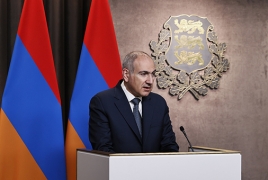
During a press conference held on April 28 as part of his official visit to Estonia, Armenian Prime Minister Nikol Pashinyan spoke about the signing of a peace agreement with Azerbaijan, emphasizing that Armenia will continue its strategic course until the document is signed.
"Our government, and I personally, are working on this issue daily. We are consistent and determined to fully, consistently, and patiently fulfill our role. We will maintain this strategy until the goal is achieved—that is, until the peace agreement is signed and peace is established. We will not deviate from this path," he stated, according to Armenpress.
The Prime Minister highlighted that if anyone hears claims that the Armenian government has deviated from its strategy, they should know that such information is not true.
Addressing Armenia's relations with Russia and the European Union, Pashinyan stated that Armenia does not aim to worsen its relations in any direction.
"This is a very important nuance. There could theoretically be two approaches: deepen ties in one direction while damaging them in another. We are not supporters of this approach. Our policy is to use our sovereignty to deepen relations in all directions where we choose to do so, and to enhance relations where they are not sufficiently deep. Armenia-European Union relations are an example of this.
Of course, there may be cases where tensions or intersections arise in different directions of our foreign relations. We believe that managing this situation requires full transparency, honesty, and openness with all our partners, ensuring that our approaches and visions are clearly understood and that there are no dark corners regarding our policies, their reasons, and justifications," concluded Pashinyan.
As part of the official visit, Armenian Prime Minister Nikol Pashinyan also received Estonian Foreign Minister Margus Tsahkna at his residence. During the meeting, the parties discussed issues related to the Armenia-Estonia bilateral agenda, emphasizing the prospects for developing political, economic, and intercultural cooperation.

